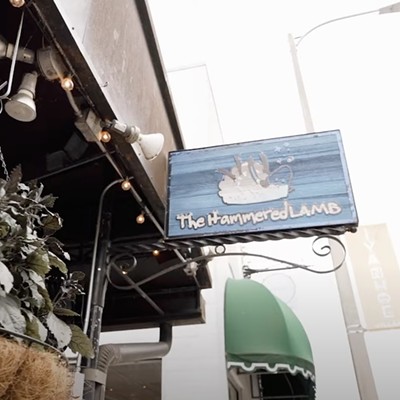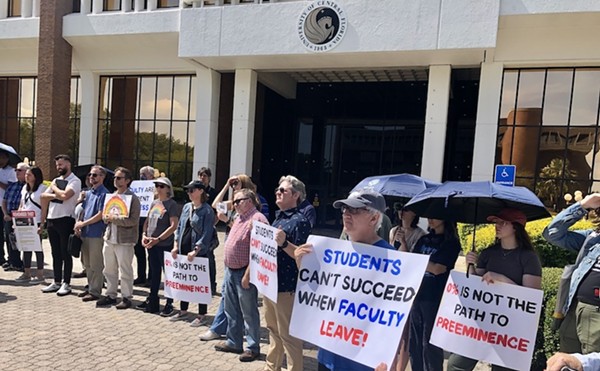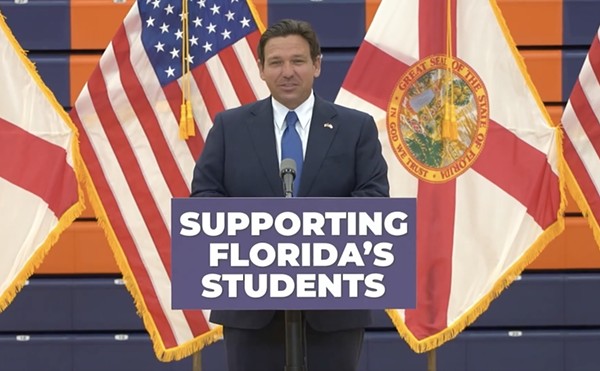When Orange County's Central Receiving Center opened in April 2003, it offered sheriff's deputies a choice. Instead of shoving yet another mentally unstable petty offender into an already-overcrowded jail, deputies could now give them a chance at treatment. The $5.1 million CRC – a recommendation of Orange County Mayor Rich Crotty's 2002 jail task force – allows patients who would otherwise end up in the 33rd Street jail to be evaluated, stabilized and referred to treatment programs. The county takes immense pride in the CRC's success. It's a place where local government stepped up to proactively help those who couldn't help themselves, and it has become a model for other parts of the country.
But it hasn't been easy. Last year CRC leaders fought to keep Gov. Jeb Bush from vetoing $2.8 million earmarked for the center. This year, again, there's no money in Bush's proposed budget, so the CRC will have to scrape for funds. As CRC leaders point out, mental health care for the indigent simply does not receive the attention or money it warrants in Central Florida.
But the center is moving forward anyway. In addition to its mental-health and substance-abuse programs, the CRC will soon enter another arena: helping the homeless. Its board will soon unveil "Phase Two," a planned facility that will not only give the homeless housing for up to a year, but a case-managed system designed to help them transition back into society and avoid bad habits. We talked with Belvin Perry, chief judge of the Orange-Osceola Judicial Circuit and chairman of the CRC's board, about the CRC's past, present and future.
Orlando Weekly: How did the CRC get started?
Belvin Perry: For a number of years, a number of us who were involved in the criminal-justice and the mental-health and substance-abuse fields talked about the need for a receiving center for people who committed crimes because of their status, and not necessarily because of their evil intent or criminal intent. … There needed to be a place to take them rather than the jail.
For years, throughout the state of Florida jails have been used basically as de facto mental-health hospitals because there were no other alternatives that law enforcement had. They either took them to the emergency rooms or they took them to the jails. The Jail Oversight Commission that Mayor Crotty convened – in its discussions the idea came up again. This time, with the mayor's leadership, that idea had a foundation to build on.
OW: The CRC was designed to alleviate pressure on the Orange County jail. What effect has it had?
BP: `I`t saved about 6,000 jail bed-space days. But the most important thing I think, if you look at it, it saved a lot of time for law enforcement. If you take that same person … if they're booked through the Orange County jail, that law enforcement officer is off the street, off of patrol for hours. It can take them from one to two hours to be booked into the jail. It takes approximately 11 minutes or less for law enforcement `to process people through the CRC`. If you look at emergency rooms, the statistics show that over 5,800 `people` were diverted from ERs. … I mean, if you say since the CRC opened three years ago it has saved 6,000 jail bed days, that equates to about 8 percent of the people from jail that don't really need to be there.
OW: What kinds of challenges does the CRC face?
BP: `There's` always the challenge of underfunding. And the next major project we have is Phase Two. A large part – about 20 percent – of the people that go through the CRC are people who are homeless, and it is very, very hard to stabilize those individuals so that they can maintain their recovery when they're homeless. And that's why we're moving forward with the planning of Phase Two. I had the privilege about four or five years ago of going to Long Beach, Calif., to a place called The Village, and I looked at how they dealt with people that suffered from mental illness, substance abuse or both and who are homeless. They had case managers who worked with them to help them break those cycles, be it homelessness, drug addiction or mental health issues. … It speaks volumes when a community can come and take a holistic approach to the whole thing.
Now, let's face reality. These folks, regardless of all the medication and stuff you give them, if they don't have a job and if they don't have a place to stay the chances of success are just not good. And that's all were trying do – create an environment so that somehow citizens in this community can have a chance to be productive again.
OW: How does Phase Two coincide with Orange County's efforts to help the homeless?
BP: You're going to need to talk to someone else about Orange County's plans. … Our ultimate goal is to connect and work with all these folks who are in the community who have been working with homeless folks for years. It's sort of time to do what we did with the CRC. The reason the CRC worked was that we got all the players `in the mental health and substance abuse fields` to the table. We got everyone to take off their egos and check 'em at the door and work together for the common good. That's what we want to do.
OW: In Miami, voters created a dedicated funding source to help the agencies that help the homeless. Is that something you think we need to consider?
BP: The only thing I'm going to say about that is that for this thing to work you are going to … need funding. Whether or not the best way to fund it is the way that Miami did, I can't say. But I think right now we're in this phase, we're looking at everything including that. But it's a little too early to say. We need to determine what our needs are, how we are going to do it, where it's going to be located, how much it's going to cost and then where do we get the funds from. … There are some existing resources that are out there. I think to just prematurely say that we're going to start taxing people, that's not necessarily a good idea. You'll kill a good idea before you get started.
OW: Let's talk about location. Whenever you locate facilities that help the homeless, there's always a battle. City commissioner Daisy Lynum and county commissioner Homer Hartage have already signaled that they don't want any new facilities in their districts.
BP: I'm not going to get involved in that fight, I'm going to leave that for the politicians as to where to locate it. … I don't think it's going to cause problems because we haven't decided on a location. We haven't even talked about downtown. The `CRC` facility that we have is the old Mercy Hospital `on Mercy Drive` and that's not downtown. Like I said, we haven't made any decisions where we're going to put it, but wherever it goes, you've got to have the services at that location to deal with those folks. We'll get that worked out, and we'll get it worked out where 95 percent of the folks are happy and satisfied.
OW: In the governor's budget for this year, there's no money set aside for the CRC, which means you guys will have to lobby for another earmark, like last year, when you got $2.8 million for more beds. But if money doesn't come through, how will that affect Phase Two?
BP: They are two separate things. The $2.8 million we're going to fight `for` in the legislative session. Phase Two is not necessarily an issue for state funding because Phase Two has to deal with housing and there are various ways that you could do that. You can do it with federal grants through HUD and other ways.
OW: What's next for the CRC?
BP: I would like … to continue to do what we are doing. … I would like to see it expand and be able to help folks transition from whatever their problems are to help them find jobs and housing so they can take care of themselves. And I would like to see us be able to help those 20 percent of those folks who come through who are homeless to help them break through that cycle. I would like to see the CRC fully funded `so` you don't have to go back begging each year and fighting each year for money, you end up saving money. … Lastly, I think as residents of Orange County we have an obligation to try and do everything we can to help folks who honestly want help. There's going to be some that don't want help, and regardless of what you do, you're not going to be able to help them. But there are a large number of people who just need a helping hand.
[email protected]
















